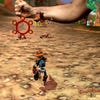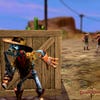The Gunstringer
Hang 'em high.
Twisted Pixel is one of the few developers capable of making games that are funny. Not just games with a few jokes in the cut-scenes, but games that play around with the nuts and bolts of the medium itself and are genuinely, inventively funny as a result. When it comes to real comedy in games, there's Twisted Pixel, there's Double Fine, and... well, that's about it.
The Gunstringer is the studio's first Kinect title and also its first retail offering after several years of brightening up Xbox Live Arcade with titles such as The Maw, 'Splosion Man and Comic Jumper. It never quite matches the lunatic heights of some of its predecessors, but there's still amusement to be found. Sadly, that doesn't include the game itself.
Cast as a skeletal outlaw, you rise from your grave as a marionette puppet and set about tracking down your treacherous former gang members in a makeshift world of cotton-reel horses and paper cut-out civilians. The action is framed as a stage show and periodically cuts back to reaction shots of the live-action audience as they gasp and applaud at your antics.
It's the sort of fourth-wall-shattering whimsy we've come to expect from a developer that used footage of its own Chief Technology Officer (the bearded Frank Wilson) as a screen-emptying smart bomb in Comic Jumper. It's also a rare flourish of imagination in a game that makes depressingly little use of Kinect for its experiments. Instead, the gameplay is much like its hero: cool to look at but in dire need of some meat on the bones.
Your left hand controls The Gunstringer, though as his forward movement is handled automatically, all you're really doing is steering him left and right and flicking your hand upwards to jump. Your right hand is his gun - point to aim his crosshairs and tag up to six enemies. Then jerking your hand upwards in the classic playground "pew pew" motion shoots.
From this thin starting point, Twisted Pixel deserves credit for trying to come up with different scenarios for these controls to work in. Most of the time you're advancing on rails, shooting enemies before they can harm you and guiding the Gunstringer around obstacles. Occasionally he'll stop and duck into cover, which you must lean out from with left-to-right sweeps of your hand.
At other times he advances up Donkey Kong-style ascending ramps and you have to throw meaningless punches to eliminate clusters of bad guys up close. Occasionally you'll have to run down the screen as boulders, logs or cannonballs chase after you. Sometimes you get two crosshairs and an endless stream of bullets to take down larger waves of bad guys (or suicidal wildlife) and there are also side-on platforming sections where your input is reduced to well-timed jumps.
Except timing jumps isn't always so easy, which brings us to the game's core weakness: Kinect. Now, I'm an avowed fan of motion gaming. Used well it can be refreshing and enormous fun. But the game has to suit the limitations of the control method, and it's here that The Gunstringer gets tangled up.
Aiming is floaty and unsatisfying. Crucially, you're not aiming at the screen (which is your natural response) but moving the crosshairs with your hand. For me, this meant that aiming at the edge of the screen meant pointing a few feet to the right of it.
Similarly, character movement is often laggy and slow, which becomes increasingly problematic as the game progresses. Later stages feature barrages of enemies and obstacles that require you to be looking in four or five directions at once, with less than a second to react. Birds dive-bomb from above while enemies throw objects at you and a yawning chasm opens beneath your feet. The sluggish controls simply aren't up to the task and the only reason you keep on going is because the game (on normal difficulty at least) props you up with frequent health refills.
So the experience is both irritatingly fiddly and pointlessly easy. You reach the end of each stage through an uneasy combination of genuine skill and largesse on the part of the game, as laissez-faire punishments make allowances for its own shortcomings.

















